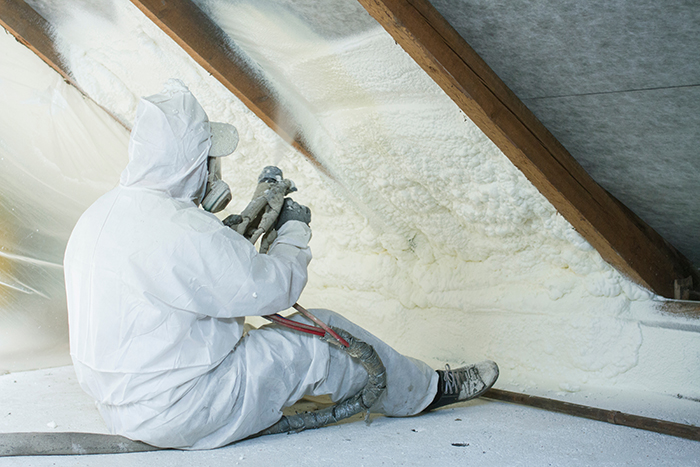
Mortgage professionals are warning homeowners to use a reputable provider when installing spray foam insulation to ensure they don’t make their homes unmarketable.
The comments were made during this week’s Lenders Live panel hosted by Knowledge Bank after Nationwide announced it is seeing a sharp increase in the number of people installing spray foam to insulate roofs, lofts and attics to help ease the cost of living.
Spray foam insulation was one of the measures covered by the government’s Green Homes Grant scheme.
The scheme, which closed in March 2022, was created to improve the energy efficiency of homes.
Many disreputable companies are exploiting homeowners and input spray foam in ways that do not comply with the manufacturer’s recommendations, putting these borrowers at risk of being turned down for a mortgage or equity release.
The Mortgage Lender head of specialist distribution and key accounts Chris Kirby says: “The risk of unreputable companies undertaking the work is the ingredients used are unknown causing a potential impact on the structural integrity of the roof.”
Kirby suggests the current cost-of-living crisis will put a “magnifying glass” on this issue for many borrowers.
However, he says “there is a lack of knowledge among consumers and borrowers”.
With the spray foam industry currently unregulated, Kirby suggests: “More work needs to be done from a regulatory perspective to direct people down the right avenues to who they should be using or what type of insulation they should be looking to have installed.”
“The mortgage market should also provide some education on what type of insulation is accepted.”
“Borrowers do not want to be in a situation where they have spray foam insulation installed and then the property is no longer suitable for the current lender or other lenders in the market because of something that could’ve been avoided,” he adds.
Meanwhile, De Havilland Group mortgage and protection adviser Neil Moakes says the issue was “news to him”.
Moakes explains the rise in the number of people using spray foam installation shows “the drive to ‘go green’ and save money on household bills is in full motion”.
But he says it’s “extremely important” that the broker community is aware of these issues so they can highlight to clients that they need to “exercise caution and thoroughly investigate any works that they’re either considering having done on the property or indeed, has already been done on the property”.
“What worries me a little is that the vast majority of clients are having a very basic valuation completed on the property rather than a survey.”
“The evaluation report is unlikely to pick up that there’s been spray foam installed because I don’t know of a single mortgage valuer who will go into the loft space to look.”
He explains: “It highlights the need for the advisor community to ensure that the clients are aware that possibly a higher level of what was traditionally called the HomeBuyers Report is done on any property.”
Alongside Moakes, Dovecote Property Finance founder Steve Olejnik says he was not aware of the spray foam issue but praised Nationwide for “making noise about it”.
With spray foam insulation gathering momentum, Olejnik says following the spike in energy prices “it’s no surprise that there’s a rush to improve energy efficiency”.
“We’ve been discussing energy efficiency for some time now because there’s a new pending energy performance certificate (EPC) regulation.”
“I’m going to be including the spray foam issue in my conversation with landlords as they look to improve the ratings on their properties.”
Olejnik says Nationwide’s “worrying statistic” is that “a quarter of a million houses will potentially be unmortgageable following the installation of spray foam, which is quite a concerning figure.”
Enness Global co-founder and managing director Hugh Wade-Jones says the issue “falls into the ever-growing category of things that you would never think of asking a client”.
He suggests that it will be something that “you will have no idea about until the valuation report comes back weeks or months down the line”.
However, he says “as everything has become a bit more granular” that questions around cosmetic or structural alterations to the property “need to fall in the initial bucket of questions that brokers ask”.
Last month, the Property Care Association (PCA) and the Residential Property Surveyors Association (RPSA) revealed that they were working with manufacturers, installers, surveyors, valuers and lenders to standardise installation procedures and develop inspection protocols for spray foam insulation.
The PCA and RPSA said they plan to release new guidance in the Spring of next year to help their members assess spray foam risks, to distinguish between good and bad installations, and to provide clarity to homeowners.
RPSA chairman Alan Milstein commented: “In this way, we expect to be able to offer lenders a more informed opinion and so enable them to review their rules which are currently restricting advances where spray foam is present.”
Earlier this month, the government announced it was going to allocate £1bn in funding from existing budgets for an ‘Eco Plus’ scheme for the next three years.
The scheme, which launches in April 2023, will cover efficiency measures for over 70,000 homes and aims to save consumers hundreds of pounds on heating bills annually.
Ministers will consult on plans to make the money available to people in council tax bands A to D.



